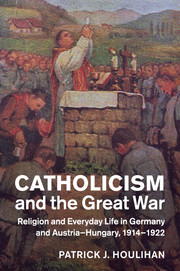Book contents
- Frontmatter
- Dedication
- Contents
- List of figures
- Acknowledgments
- Note on the text
- List of abbreviations
- Introduction
- 1 Catholicism on the eve of the Great War in Germany and Austria-Hungary
- 2 Theology and catastrophe
- 3 The limits of religious authority: military chaplaincy and the bounds of clericalism
- 4 Faith in the trenches: Catholic battlefield piety during the Great War
- 5 The unquiet homefront
- 6 A voice in the wilderness: the papacy
- 7 Memory, mourning, and the Catholic way of war
- Conclusion
- Sources
- Index
Conclusion
Published online by Cambridge University Press: 05 May 2015
- Frontmatter
- Dedication
- Contents
- List of figures
- Acknowledgments
- Note on the text
- List of abbreviations
- Introduction
- 1 Catholicism on the eve of the Great War in Germany and Austria-Hungary
- 2 Theology and catastrophe
- 3 The limits of religious authority: military chaplaincy and the bounds of clericalism
- 4 Faith in the trenches: Catholic battlefield piety during the Great War
- 5 The unquiet homefront
- 6 A voice in the wilderness: the papacy
- 7 Memory, mourning, and the Catholic way of war
- Conclusion
- Sources
- Index
Summary
Pope Benedict XV, the “unknown pope” of the Great War, died on January 22, 1922, after a short illness. The conclave elected a new leader, Pope Pius XI, who, in his position as papal nuncio, had seen the Bolshevik armies advance on Warsaw during the Polish–Soviet War; the Church endured, its leadership increasingly turning to authoritarian alliances that would confront the specter of Bolshevism. Papal funerals were and are symbolic points of reflection for the Church, and the choice of an end date to this study is deliberately arbitrary. Since this book has argued for continuities and adaptations of traditions, especially in the everyday lives of ordinary Catholics, such a stopping point represents a narrative convenience.
Chronologically, the story could have easily extended further. The Franco-Belgian occupation of the Ruhr and the Beer Hall Putsch in 1923 would have been another leap along the road to Hitler's accession to the chancellorship of Germany. In Austria, the decisive shift to authoritarianism happened with the Justice Ministry fire of 1927, which helped lead to civil war in 1934. Indeed, explicating the full political legacy of two fallen empires, Habsburg and Hohenzollern, would require treating the histories of their individual state components, as well as the transnational, national, local, familial, and personal levels. Although the empires fell in Autumn 1918, this book has shown how this political narrative of historians’ convenience does not correspond to the lived religion of believers who experienced the Great War. The Catholic story of the twentieth century does not fit the standard story of the Great War as an epic moment of disillusioning modernism, either in 1914 or in 1918. Indeed, the persistence and adaptation of Catholic tradition helps lend strength to the claim that the period from 1914 to 1945 is best seen as a continuum, a “Second Thirty Years War.” In helping make sense of the twentieth century, this book has demonstrated a transnational Catholicism of lived religion, destabilizing a master narrative of disillusion for the losing powers' cultural history.
- Type
- Chapter
- Information
- Catholicism and the Great WarReligion and Everyday Life in Germany and Austria-Hungary, 1914–1922, pp. 254 - 265Publisher: Cambridge University PressPrint publication year: 2015



